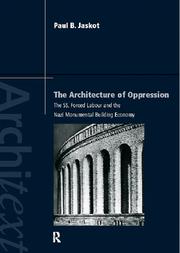| Listing 1 - 3 of 3 |
Sort by
|
Book
ISBN: 3737007594 3847007599 3847107593 Year: 2017 Publisher: Göttingen, [Germany] : V&R unipress,
Abstract | Keywords | Export | Availability | Bookmark
 Loading...
Loading...Choose an application
- Reference Manager
- EndNote
- RefWorks (Direct export to RefWorks)
Albert Speer ist es mit seinen autobiographischen Erinnerungen gelungen, nachhaltigen Einfluss auf seine Wahrnehmung in der Öffentlichkeit zu nehmen. Roman B. Kremer analysiert die rhetorischen Muster in Speers Text und setzt sie in Kontrast zu den rhetorischen Verfahren autobiographischer Texte anderer NS-Politiker und -Militärs wie Baldur von Schirach, Karl Dönitz und Erich Raeder. Seine Studie zeigt eindrucksvoll, mit welcher rhetorischen Raffinesse Speer seine Erinnerungen aufgebaut hat. Daraus ergeben sich grundsätzliche Erkenntnisse zum bislang oft unterschätzten Zusammenhang von Autobiographie und Rechtfertigung. Through his autobiographical memoirs, Albert Speer successfully managed to have a lasting influence on his public perception. Roman B. Kremer analyses the rhetorical patterns within Speer’s text and contrasts them with the rhetorical methods found within the autobiographical texts of other NS politicians and militarists, such as Baldur von Schirach, Karl Dönitz and Erich Raeder. His study impressively demonstrates the rhetorical finesse of Speer’s memoirs, picking up on fundamental insights into the relationship between autobiography and justification, which have often been somewhat discounted in the past.
Speer, Albert, --- Shpeer, Alʹbert, --- Speer, Berthold Konrad Hermann Albert, --- Шпеер, Альберт, --- Biography & Autobiography / Political --- Germany --- History --- Historiography.
Book
ISBN: 9780300226416 9780300190441 0300190441 9780300216004 0300216009 Year: 2015 Publisher: Yale University
Abstract | Keywords | Export | Availability | Bookmark
 Loading...
Loading...Choose an application
- Reference Manager
- EndNote
- RefWorks (Direct export to RefWorks)
In his best-selling autobiography, Albert Speer, Minister of Armaments and chief architect of Nazi Germany, repeatedly insisted he knew nothing of the genocidal crimes of Hitler's Third Reich. In this revealing new biography, author Martin Kitchen disputes Speer's lifelong assertions of ignorance and innocence, portraying a far darker figure who was deeply implicated in the appalling crimes committed by the regime he served so well. Kitchen reconstructs Speer's life with what we now know, including information from valuable new sources that have come to light only in recent years, challenging the portrait presented by earlier biographers and by Speer himself of a cultured technocrat devoted to his country while completely uninvolved in Nazi politics and crimes. The result is the first truly serious accounting of the man, his beliefs, and his actions during one of the darkest epochs in modern history, not only countering Speer's claims of non-culpability but also disputing the commonly held misconception that it was his unique genius alone that kept the German military armed and fighting long after its defeat was inevitable.
Cabinet officers --- Architects --- Nazis --- War criminals --- Speer, Albert, --- Germany --- Allemagne --- Politics and government --- Military policy. --- Politique et gouvernement --- Politique militaire --- Architecture --- History --- BIOGRAPHY & AUTOBIOGRAPHY / Historical. --- HISTORY / Military / World War II. --- HISTORY / Europe / Germany. --- Political and social views. --- 72.07 --- Architectuur ; stedenbouw ; Berlijn ; 1937-1943 ; A. Speer --- Architectuur en nazisme --- Speer, Albert 1905-1981 (°Mannheim, Duitsland) --- Cabinet ministers --- Ministers of State --- Secretaries of State --- Public officers --- Architecten. Stedenbouwkundigen A - Z --- Shpeer, Alʹbert, --- Speer, Berthold Konrad Hermann Albert, --- Шпеер, Альберт, --- Third Reich, 1933-1945 --- Propaganda --- Architectuur --- Politiek --- Archief --- Digitalisering --- Maatschappij --- Film --- Godsdienst --- Cultuur --- Oorlogspropaganda

ISBN: 1134594623 128040065X 0203007670 0203169654 9780203169650 9780203007679 9780415173667 0415173663 9780415223416 0415223415 0203030257 9780203030257 9786610400652 6610400652 0415173663 0415223415 9781134594573 9781134594610 9781134594627 1134594615 Year: 2000 Publisher: London New York Routledge
Abstract | Keywords | Export | Availability | Bookmark
 Loading...
Loading...Choose an application
- Reference Manager
- EndNote
- RefWorks (Direct export to RefWorks)
This book re-evaluates the architectural history of Nazi Germany and looks at the development of the forced-labour concentration camp system. Through an analysis of such major Nazi building projects as the Nuremberg Party Rally Grounds and the rebuilding of Berlin, Jaskot ties together the development of the German building economy, state architectural goals and the rise of the SS as a political and economic force. As a result, The Architecture of Oppression contributes to our understanding of the conjunction of culture and politics in the Nazi period as well as the agency of architects and SS administrators in enabling this process.
National socialism and architecture. --- Forced labor --- Concentration camps --- Architecture and national socialism --- Nazi architecture --- Architecture --- Schutzstaffel. --- Germany --- Third Reich, 1933-1945 --- Politics and government --- Economic policy --- National socialism and architecture --- 72.036 --- 72.03 --- Duitsland --- Nazi-architectuur --- Speer, Albert --- 20ste eeuw (architectuur) --- Twintigste eeuw (architectuur) --- Architectuur (geschiedenis) --- Architectuurgeschiedenis --- Nationalsozialistische Deutsche Arbeiter-Partei. --- Black Corps (Germany) --- Okhrannye otri︠a︡dy Nat︠s︡ional-sot︠s︡ialisticheskoĭ partii Germanii --- Okhrannye otri︠a︡dy NSDAP --- Schutzstaffel, Nationalsozialistische Deutsche Arbeiter-Partei --- SS --- SS (Organization) --- Nationalsozialistische Deutsche Arbeiter-Partei --- Nazi concentration camps --- 1933-1945 --- Nationalsocialistische Deutsche Arbeiter-Partei. Schutzstaffel --- Nationalsozialistische Deutsche Arbeiter-Partei. Schutzstaffel --- Nationalsozialistische Deutsche Arbeiter-Partei. - Schutzstaffel.
| Listing 1 - 3 of 3 |
Sort by
|

 Search
Search Feedback
Feedback About UniCat
About UniCat  Help
Help News
News